The Pope had his weekly Wednesday Audience today Hurrah!!! I got the pics from this photo section of the Ratzinger Forum. There are more there. They have provided a quick English translation here. I have that posted below. Another talk about Paul by the Pope here.
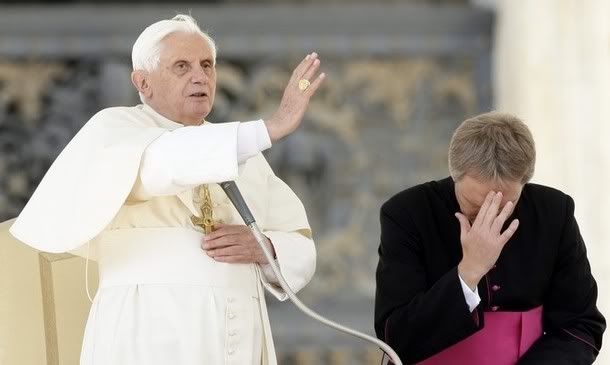 Here is a translation of the Holy Father's catechesis at the General Audience today in St. Peter's Square. He continues his present teaching cycle on St. Paul.
Here is a translation of the Holy Father's catechesis at the General Audience today in St. Peter's Square. He continues his present teaching cycle on St. Paul.
Dear brothers and sisters, The respect and veneration that St. Paul always cultivated for the Twelve Apostles were not any less when he defended with frankness the truth of the Gospel, which is none other than Jesus Christ, the Lord.
We wish today to consider two episodes which demonstrate the veneration and, at the same time, the freedom with which the Apostle Paul addressed Cephas (Peter) and the other Apostles: the so-called 'Council' of Jerusalem and the incident at Antioch of Syria, reported in the Letter to the Galatians (cfr 2,1-10; 2,11-14). Every Council and Synod of the Church is 'an event of the Spirit' and represents the collective judgments of all the People of God - those who received the gift of participating in the Second Vatican Council experienced this personally.
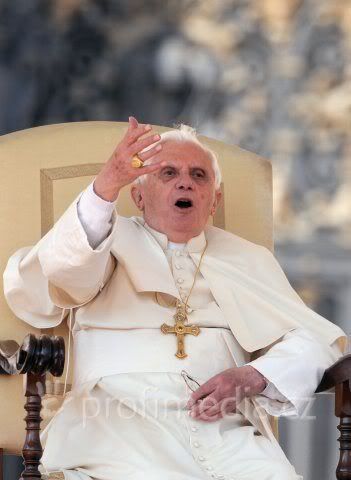 Thus, St. Luke, informing us about the first Council of the Church, which took place in Jerusalem, introduced the letter which the Apostles sent under those circumstances to the Christian communities in diaspora, in this manner: "'It is the decision of the holy Spirit and of us..."(At 15,28).
Thus, St. Luke, informing us about the first Council of the Church, which took place in Jerusalem, introduced the letter which the Apostles sent under those circumstances to the Christian communities in diaspora, in this manner: "'It is the decision of the holy Spirit and of us..."(At 15,28).
The Spirit, who operates in the whole Church, leads the Apostles by the hand in undertaking new paths to realize his plans: it is he who is the principal artisan in the edification of the Church. And yet, the assembly of Jerusalem took place at a time of not insignificant tension within the original (Christian) community.
It had to do with whether circumcision should be required of pagans who were professing adherence to Jesus Christ, the Lord; or whether it would be licit to consider them unbound by Mosaic Law - that is, the observance of the [Jewish] norms for being 'just men' who comply with the Law - and above all, whether they were free of the Jewish norms governing ritual purification, pure and impure foods, and the Sabbath.
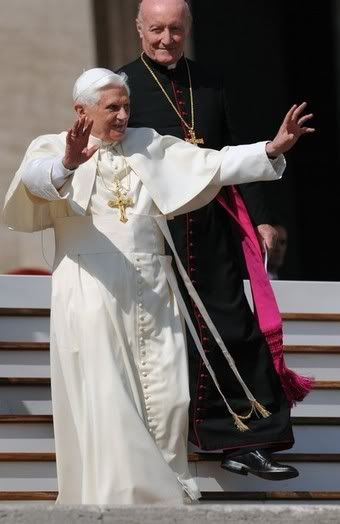 St. Paul himself refers to the Jerusalem assembly in Gal 2,1-10. Fourteen years after his encounter with the Risen Lord in Damascus - we are now in the second half of the decade of the 40s after Christ - Paul leaves with Barnabas from Antioch of Syria, and is accompanied by Titus, his faithful collaborator who, although of Greek origin, did not have to be circumcised upon entering the Church.
St. Paul himself refers to the Jerusalem assembly in Gal 2,1-10. Fourteen years after his encounter with the Risen Lord in Damascus - we are now in the second half of the decade of the 40s after Christ - Paul leaves with Barnabas from Antioch of Syria, and is accompanied by Titus, his faithful collaborator who, although of Greek origin, did not have to be circumcised upon entering the Church.
On this occasion, Paul explains to the Twelve, defined as the persons most appropriate to be consulted on the matter, his gospel about freedom from the (Mosaic) Law (cfr Gal 2,6). In the light of his encounter with the Risen Christ, he understood that at the moment of passage to the Gospel of Jesus Christ, pagans no longer need circumcision, dietary laws and (observance of) the Sabbath, as signs of being just: Christ is our justice, and 'just' is everyone who conforms to him. No other signs are needed to be considered just.
In the Letter to the Galatians, he describes in some lines how the Jerusalem assembly went. Enthusiastically, he recalls that the gospel of freedom from the Law was approved by James, Cephas and John, the 'pillars', who offered the right hand of ecclesial communion to him and Barnabas (cfr Gal 2,9).
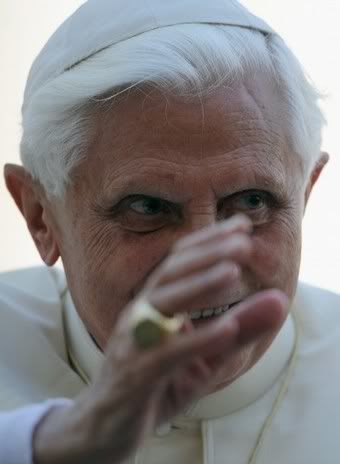 If, as we noted, for Luke the Council of Jerusalem expressed the action of the Holy Spirit, for Paul, it represented the decisive acknowledgment of the freedom shared by all those who took part: a freedom from the obligations deriving from circumcision and the Law - that freedom for which "Christ liberated us so that we may remain free" and so we may no longer allow the yoke of slavery to be imposed on us (cfr Gal 5,1).
If, as we noted, for Luke the Council of Jerusalem expressed the action of the Holy Spirit, for Paul, it represented the decisive acknowledgment of the freedom shared by all those who took part: a freedom from the obligations deriving from circumcision and the Law - that freedom for which "Christ liberated us so that we may remain free" and so we may no longer allow the yoke of slavery to be imposed on us (cfr Gal 5,1).
The two modalities with which Paul and Luke describe the assembly in Jerusalem have in common the liberating action of the Spirit, because "where the Spirit of the Lord is, there freedom is", Paul would say in the second Letter to the Corinthians (cfr 3,17).
Nonetheless, as it appears with great clarity in the Letters of St. Paul, Christian freedom is never identical to libertinage, the arbitrary freedom to do as we please. Christian freedom is realized in conformity with Christ, and therefore in authentic service for our brothers, especially those who are most needy.
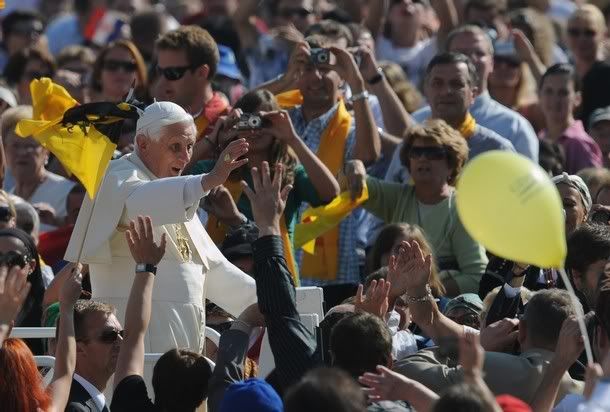 That is why Paul's account of the assembly closes with a reminder of the recommendation that he addressed to the Apostles: "Only, we were to be mindful of the poor, which is the very thing I was eager to do" (Gal 2,10). Every Council is born from the Church and turns back to the Church.
That is why Paul's account of the assembly closes with a reminder of the recommendation that he addressed to the Apostles: "Only, we were to be mindful of the poor, which is the very thing I was eager to do" (Gal 2,10). Every Council is born from the Church and turns back to the Church. On that occasion, it turned back with attention for the poor, which, from Paul's comments in his Letters, meant, above all, those belonging to the Church of Jerusalem.
In his concern for the poor, attested in particular in the second Letter to the Corinthians (cfr 8-9), and in the concluding part of the Letter to the Romans (cfr Rm 15), Paul shows his faithfulness to the decisions that had matured in the (Jerusalem) assembly. Perhaps we are no longer able to fully comprehend the significance that Paul and his communities attributed to collecting money for the poor of Jerusalem.
It was an initiative that was completely new in the panorama of religious activities (known till then): it was not obligatory, but free and spontaneous. All the Churches founded by Paul in the West took part in it. The collection expressed the debt owed by these communities to the mother Church in Palestine, from whom they had received the unutterable gift of the Gospel. Paul attached so much value to this gesture of sharing that he rarely called it simply 'collection' - for him it was rather 'service', 'blessing', 'love', 'grace', even 'liturgy' (2 Cor 9).
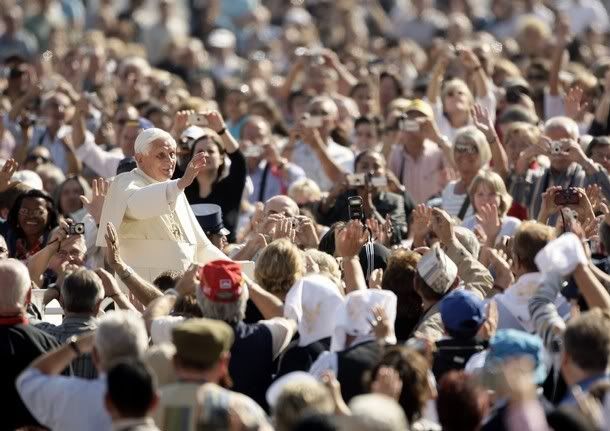
Particularly surprising is that last term, which confers on the collection of money a cultural value as well: on the one hand, it is a liturgical gesture or 'service', offered by every community to God; on the other, it is an act of love done for the benefit of the people. Love for the poor and divine liturgy go together - love for the poor is liturgy.
The two horizons are present in every liturgy celebrated and lived within the Church, which by its nature opposes separation between worship and life, between faith and good works, between prayer and charity for our brothers. Thus, the Council of Jerusalem started out to discuss the question of how to deal with pagans joining the faith - choosing to free them from circumcision and observances imposed by Mosaic Law, and ended with the ecclesial and pastoral decision that the Church must be centered on faith in Jesus Christ, and love for the poor of Jerusalem and of the whole church.
The second episode is the well-known incident in Antioch of Syria, which attests to the interior freedom that Paul enjoyed: how to act during communion at table among believers of Jewish origin and Gentiles. What emerges is the other epicenter of Mosaic observance: the distinction between pure and impure foods, which profoundly divided observant Jews from the pagans. Initially, Cephas-Peter shared the meal with one or the other.
But with the arrival of some Christians connected to James, 'the brother of the Lord' (Gal 1,19), Peter started to avoid contacts at table with the pagans, in order not to scandalize those who continued to observe the laws of dietary purity, a choice which was shared by Barnabas
This profoundly divided the Christians who had been circumcised and those who had been pagan. This behavior, which genuinely threatened the unity and freedom of the Church, aroused a heated reaction from Paul who came to accuse Peter and the others of hypocrisy: "If you, though a Jew, are living like a Gentile and not like a Jew, how can you compel the Gentiles to live like Jews?" (Gal 2,14). Actually, they had different preoccupations - Paul, on the one hand; Peter and Barnabas, on the other. For the latter, separation from the pagans represented a way to protect and not scandalize believers who had come from Judaism.
For Paul, instead, it meant the danger of misunderstanding (the idea of) universal salvation in Christ which is offered to Jews as well as pagans. If justification can be realized only by virtue of faith in Christ, of conformity to him, without any working of the Law, what sense was there in continuing to observe dietary purity when sharing the (Communion) meal?
Very likely, Peter and Paul's perspectives were different: for the first, it was not to lose the Jews who had adhered to Christ's Gospel; for the second, it was not to diminish the redemptive value of the death of Christ for all believers. Strangely, when writing to the Christians of Rome some years later (around the middle of the 50s decade A.D.), Paul found himself in an analogous situation and he would ask the 'strong' not to eat impure food in order not to lose or scandalize the 'weak': "It is good not to eat meat or drink wine or do anything that causes your brother to stumble" (Rom 14, 21).
So the incident at Antioch was a lesson for Peter as well as for Paul. Only sincere dialog, open to the truth of the Gospel, can orient the path of the Church: "The kingdom of God is not a matter of food and drink, but of righteousness, peace, and joy in the holy Spirit" (Rom 14,17).
It is a lesson that we, too, should learn: With the different charisms given to Peter and to Paul let us all be guided by the Holy Spirit, seeking to live in that freedom which finds its orientation in faith in Christ and is made concrete by service to our brothers. What is essential is to conform always to Christ. It is thus that one becomes truly free, and that we ourselves express the most profound nucleus of the Law: love for God and neighbor. Let us pray the Lord that he teach us to share his sentiments, to learn from him true freedom and evangelical love which embraces every human being.
In English, he said:
Dear Brothers and Sisters, In our continuing catechesis on Saint Paul, we now consider two events which illustrate Paul’s relationship to the Twelve, which combined respect for their authority with frankness in the service of the Gospel. At the Council of Jerusalem Paul defended before the Twelve his conviction that the grace of Christ had freed the Gentiles from the obligations of the Mosaic Law. Significantly, the Church’s decision in this matter of faith was accompanied by a gesture of concrete concern for the needs of the poor (cf. Gal 2:10).
By endorsing Paul’s collections among the Gentiles, the Council thus set its teaching on Christian freedom within the context of the Church’s communion in charity. Later, in Antioch, when Peter, to avoid scandalizing Jewish Christians, abstained from eating with the Gentiles, Paul rebuked him for compromising the freedom brought by Christ (cf. Gal 2:11-14). Yet, writing to the Romans years later, Paul himself insisted that our freedom in Christ must not become a source of scandal for others (cf. Rom 14:21).
Paul’s example shows us that, led by the Spirit and within the communion of the Church, Christians are called to live in a freedom which finds its highest expression in service to others. I offer a warm welcome to the new students of the Pontifical Irish College. May your priestly formation in the Eternal City prepare you to be generous and faithful servants of God’s People in your native land. I also greet the Missionary Sisters of the Society of Mary on the occasion of their General Chapter. Upon all the English-speaking pilgrims, especially those from Ireland, Australia, Japan, Hong Kong, South Korea, Trinidad and Tobago, Canada and the United States, I invoke God’s abundant blessings.















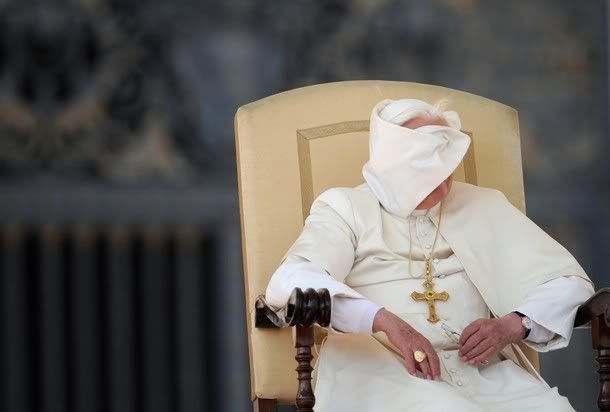
No comments:
Post a Comment